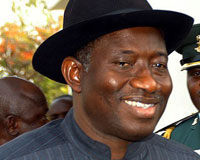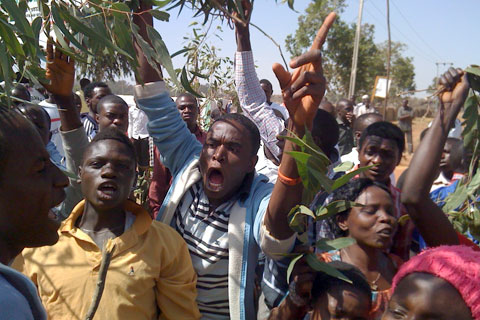Nigeria: ‘Election violence was planned’
by - 4th May 2011
 A statement released by the ecumenical Christian Association of Nigeria (CAN) on Sunday has urged the government to carry out a review of violence in the wake of national elections.
A statement released by the ecumenical Christian Association of Nigeria (CAN) on Sunday has urged the government to carry out a review of violence in the wake of national elections.
The statement, signed by CAN Chairman Roman Catholic Archbishop Peter Jatau and Secretary Elder Saidu Dogo, said: ‘The association believes that the violence was well-planned and was a calculated attempt to undermine the corporate existence of the Nigerian nation.
‘CAN in the 19 Northern states believe that the violence was both political and religious because Christians and their churches and property were the main targets for destruction by the perpetrators of the violence.
‘Even those Muslims who were perceived to be supporters of the People’s Democratic Party (PDP), which they branded as a Christian party, were equally attacked.’
Most Western media reports have explained the post-election violence as a straight religious fight between the Christian south and the Muslim north.
But analysis carried out by Lapido Media, indicates that this fails to recognise the socio-political complexities of the region.
An estimated 500 people were massacred, bludgeoned to death and burnt alive in northern Nigerian states since PDP leader Goodluck Jonathan was declared president following voting on 16 April.
The Guardian puts the mayhem down to “religious tensions” arising after supporters of presidential candidate General Muhammadu Buhari – a Muslim from the north - lost out to Jonathan, a Christian and a southerner.
BBC News reported that Muslims were ‘nervous’ of Christians winning the Presidency – but gave no reason.
Supporters of Buhari and the Congress for Progressive Change (CPC) took to the streets amid claims of vote-rigging in favour of Jonathan and the PDP.
Buhari told Al Jazeera: ‘We have evidence in our hands that the computers [used in the voting process] were programmed to produce rigged results.’
This despite Western bodies including the UK Foreign Office, the European Union, the US International Republican Institute and the Commonwealth Secretariat all hailing the elections a success.
In northern states, including Kaduna, Kano, Bauchi and Zaria, the homes and businesses of both Christians and Muslims were burnt alongside churches and mosques.
 While the majority of the attacks, which included the murders of several of the Nigerian Youth Service Corps (NYSC) employed to administer the elections, were perpetrated by disaffected Muslim youths, Christians carried out reprisal attacks in the rural areas of Kaduna.
While the majority of the attacks, which included the murders of several of the Nigerian Youth Service Corps (NYSC) employed to administer the elections, were perpetrated by disaffected Muslim youths, Christians carried out reprisal attacks in the rural areas of Kaduna.
Following the end of military rule in Nigeria in 1999, the PDP - which splits its leadership on religious grounds – was in power with Olusegun Obasanjo as president until 2007.
Muslim politicians had insisted that since Obasanjo was a Christian, a Muslim should be in power until at least 2015. But when Muslim president Umaru Yar’Adua died in office last year, he was replaced by Jonathan – a Christian.
Speaking to Lapido Media, Lagos-based writer Chris Ihidero put the willingness of the masses to commit violence at the behest of religious leaders down to poverty.
‘The fighters themselves are as much victims as the people they kill, as they have been left uneducated by the northern élite and made to remain uncivilised in order to be used for purposes such as this.
‘Politics is at the core of the violence; religion is only employed to disguise the truth’, he said.
Criticising the Western media coverage of the post-election violence, he added: ‘The coverage has been too general in too many parts. In the reports I have seen on CNN, Al Jazeera and the BBC, too little time has been spent looking at the specifics of the situation.
‘It's been about how post-election violence has erupted in violent northern Nigeria. Body counts have been estimated and many of the reports have pitched a north versus south scenario.
‘A lot of them have missed the internal wranglings, the possibility of sponsorship of the violence, the perpetrators who have done this time and again without ever having to face criminal charges, the irresponsibility of state governors who have been unable to do anything about these killings overtime.
‘The path to true reconciliation and an end to this recurring inhumanity will only begin when all concerned begin to pay attention to the specifics.’
For Louis Eke, Nation Desk Editor at Next newspaper in Nigeria, the religious angle is easy to pick, as it is the most familiar in the north of Nigeria. He told Lapido: ‘If the attacks were not religious, churches ought not to have been targeted.
‘In reality, however, given the history of that region of the country regarding their attitude towards Christians, it is hardly a surprise that religious meaning is being read into the incident.
‘So while the riots were triggered by politics, the deep-seated animosity towards Christians fuelled the violence.’
Read our analysis of Western media’s take on the election violence here »
- Log in to post comments
